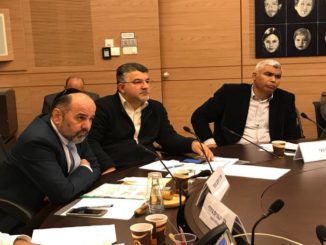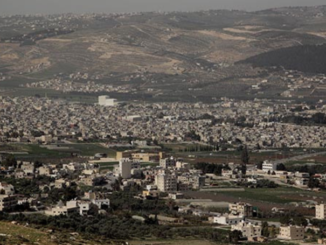
By Benay Blend
In the run-up to the elections, Joe Biden declared that what unites the United States and Israel goes beyond the exchange of weapons, though that is a major part of his agenda. It is instead the much more abstract notion of a “shared soul” between the two countries, “generation after generation.” Indeed, he wasn’t all that wrong.
For many people in this country—and for those abroad who have been the victims of America’s foreign policy—what is most troublesome today has a history that goes back long before recent Supreme Court (SCOTUS) decisions.
On June 24, SCOTUS overturned its landmark 1973 Roe v. Wade decision, ruling that the US Constitution does not guarantee the right to have an abortion; on June 23, the Supreme Court ruled that people have the right to carry weapons in public for self-defense; in a 6-3 ruling earlier this week the court ruled that Congress does not have the authority to give the Environmental Protection Agency (EPA) the authority to do what it is supposed to do, i.e. mandate its own regulatory rules; and finally, on June 29, SCOTUS ruled against tribal sovereignty in Oklahoma v. Castro-Huerta, a case that could have far-reaching consequences beyond Oklahoma.
All of these decisions have been criticized for taking away freedoms that had been won over the past 50 years. There is concern that SCOTUS will next go after voting rights, LGTBQ rights, and all other rights that are not specifically stated in the Constitution. This has brought out justifiable outrage but for some it’s just a continuation of the wrongs that various communities have experienced since even before the founding of the country.
Now more than ever, the words of the late civil rights activist Fannie Lou Hammer are important. Speaking before the National Women’s Political Caucus in 1971, she proclaimed that “nobody’s free until everybody’s free,” a call for the liberation of all people, not just those who for the moment are in the limelight.
Hammer’s work focused on voting rights at a time when Black people were denied the ballot. A major roadblock in Mississippi at the time was the state’s Democratic Party, so she organized the Mississippi Freedom Democratic Party(MFDP) with the end goal of challenging the Democrats at the national level. Nevertheless, their efforts were thwarted by President Lyndon Johnson, who placed the party before principles, a problem that frustrates activists to this day.
At the same time, Kwame Turé (Stokely Carmichael) was moving beyond electoral politics by institutionalizing the term Black Power as well as founding the All-African People’s Revolutionary Party (AAPRP), a mass organization that internationalized the movement for Black rights. On what would have been his 81st birthday on June 29, after dying of cancer at the age of 57, Turé’s name continues to be associated with radical grassroots communities organizing against capitalism and corporate privatization.
This month marks another anniversary, that of 50 years since the assassination of Palestinian intellectual/freedom fighter Ghassan Kanafani. Like Turé, he was an internationalist and also anti-imperialist, described by Louis Brehony as a leader whose “legacy lives on in every Palestinian and internationalist willing to fight for the anti-imperialist cause.”
Kanafani also understood the importance of political education, a goal that Turé supported, too. Brehony quotes him saying:
“The goal of education is to correct the march of history. For this reason, we need to study history and to apprehend its dialectics in order to build a new historical era, in which the oppressed will live, after their liberation by revolutionary violence, from the contradiction that captivated them”.
In his most recent tribute, Ramzy Baroud reminds readers that Kanafani always emphasized the importance of context when discussing the Palestinian cause. “The role of the Palestinian intellectual,” Baroud relates, must include that of “unpacking historical, political and geopolitical facts to others,” rather than leaving that role to others who too “often speak on behalf of Palestinians.”
Returning to the Court, it’s not enough to focus on the present, as Turé and Kanafani knew. Both stressed the need for political education, learning about the past in order to put the present into context. They also saw the need for international liberation by connecting the dots around the world.
As Ilan Pappé wrote in the Foreword to Ramzy Baroud’s The Last Earth: A Palestinian Story (2018), Al-Nakba al-Mustamera (on-going Nakba) describes the period after 1948 when events are not just what happened in the past, but rather very much a part of the present (p. xi). In this era of collapsing time, its more important than ever to place contemporary issues within a broader historical context.
On that note, as Kanafani wrote, “the Palestinian cause is not a cause for Palestinians only, but a cause for every revolutionary,” there should have been more outrage when Ayelet Shaked called for the slaughter of Palestinian mothers who give birth to “little snakes.” Written many years before the overturning of Roe v Wade, Shaked’s call for genocide of Palestinian people via the murder of their mothers was surely just as much an attack on women’s reproductive rights. If the recent SCOTUS decision is put into historical context, then its clear that there is a long history of attacks against women’s rights, and this one was made by a woman who saw all Palestinians as the enemy.
If the same analysis is applied to the Huerta decision, which gave the states the authority to prosecute non-tribal members who commit crimes against Native Americans on Indian territory, it is clear that attacks on tribal sovereignty have a history. As Oceti Sakowin Oyate (Great Sioux Nation of the Nation of the Seven Council Fires) scholar/activist Nick Estes tweeted: “SCOTUS achieved today what white supremacists tried with termination,” specifically, the period from 1953 to 1968 when House Concurrent Resolution 108 strongly encouraged Native people to leave their reservations for urban areas where there was rampant racism and little opportunity.
If, as Kanafani said, the Palestinian struggle is shared by all of “the exploited and oppressed masses in our era,” then Native activists know to link their struggle with the Palestinians. “Every Israeli bomb and bullet used against Palestinians and paid for by USA dollars has been consummated by the blood and soil of American Indians,” tweetedEstes, thus linking the indigenous struggle in Palestine with his own.
Indeed, in a recent decision, Israel’s high court approved the forced transfer of more than 1000 Palestinians in the Masafer Yatta area of the southern West Bank. As Maureen Clare Murphy notes, if carried out, this will be “one of the single largest expulsions of Palestinians since it occupied the West Bank and Gaza Strip in 1967.”
“Many of us can recall some of the most famous sayings of the revolutionary Palestinian intellectual Ghassan Kanafani,” writes Omar Zahzah, “but current events are also providing each one of us dedicated to Palestinian liberation the opportunity to begin to commit to these sentiments through practice.”
Hopefully, the examples above provide some context, while the Mapping Project discussed below provides the tools. As Zahzah outlines in his article, the endeavor is a collective of activists who wanted to put a material face to the connections between “local institutional support for the colonization of Palestine and harms that [the project sees] as linked, such as policing, US imperialism, and displacement/ethnic cleansing.”
As such, Zahzah states that the project provides “a detailed, locally-derived index of collaborative institutions that, with various degrees of visibility, either directly participate in or help refine and support the violence work of colonial policing across borders.”
“Just as Kanafani observed decades prior,” concludes Zahzah, “the ongoing fight for total liberation and return necessitates a ruthless comprehension of how local systems of violence realize global dimensions.”
With so many tools at hand, there is no longer an excuse for ignoring the global links between what Zahzah calls “our shared oppression across the imperialized globe.” On the anniversaries of their death and life respectively, Kanafani and Turé would be pleased that their work continues in the hands of current activists.

– Benay Blend earned her doctorate in American Studies from the University of New Mexico. Her scholarly works include Douglas Vakoch and Sam Mickey, Eds. (2017), “’Neither Homeland Nor Exile are Words’: ‘Situated Knowledge’ in the Works of Palestinian and Native American Writers”. She contributed this article to The Palestine Chronicle.







